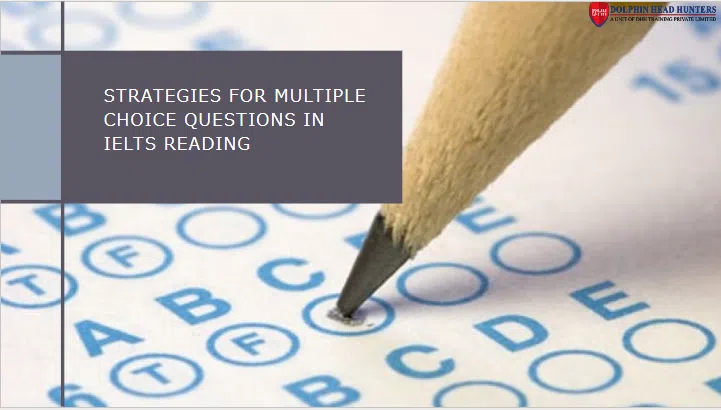Strategies for Multiple Choice Questions in IELTS Reading – The IELTS Reading test assesses your ability to understand and interpret written English through various question types, one of the most common being multiple-choice questions. These questions require you to select the best answer from a list of options based on the information provided in the reading passage. Given their importance and prevalence, mastering strategies for tackling multiple-choice questions can significantly enhance your performance and boost your overall IELTS score. In this blog, we’ll explore effective strategies for approaching multiple-choice questions in the IELTS Reading section.
Understanding the Multiple Choice Question Format
Before diving into strategies, it’s important to understand the structure of multiple-choice questions in the IELTS Reading test:
- Question Stem: This is the part of the question that presents the main idea or inquiry you need to address.
- Answer Options: You’ll be given several options, usually labeled A, B, C, D, etc. Only one of these options is correct.
- Reading Passage: You need to find the information in the passage that corresponds to the question stem and select the correct answer from the options.
Effective Strategies for Multiple Choice Questions
1. Read the Questions First
Start by reading the multiple-choice questions before diving into the passage. This strategy helps you know what to look for and focus on specific information as you read the passage. By understanding the questions in advance, you can identify keywords and themes that will guide your reading.
2. Scan for Keywords
Identify and underline keywords or phrases in the questions and answer options. Keywords are specific terms or phrases that are crucial to understanding the question. As you read the passage, keep an eye out for these keywords or their synonyms to locate relevant information quickly.
3. Understand the Passage Structure
Quickly skim the passage to get an overview of its structure and main ideas. Understanding the organization of the passage, such as the introduction, body paragraphs, and conclusion, can help you locate specific information more efficiently.
4. Focus on Synonyms and Paraphrasing
IELTS reading passages often use synonyms or paraphrasing to present information. The language used in the passage might differ from the wording of the questions and answer options. Pay close attention to how ideas are expressed differently and use this knowledge to match information with the answer choices.
5. Eliminate Wrong Answers
When faced with multiple-choice questions, start by eliminating obviously incorrect answers. Even if you are unsure of the correct answer, narrowing down the options increases your chances of selecting the right one. Focus on answers that are clearly not supported by the passage or are irrelevant to the question.
6. Be Cautious of Distractors
Distractors are answer choices that seem plausible but are incorrect. They are designed to mislead or confuse test-takers. Be cautious of answers that contain extreme language (e.g., “always,” “never”) or those that only partially address the question. Ensure that the answer you choose directly corresponds to the information in the passage.
7. Check for Traps and Misleading Information
Sometimes, multiple-choice questions may include traps or misleading information. For example, an answer option may be partially correct but not entirely accurate. Carefully verify that the answer choice fully addresses the question and aligns with the passage content.
8. Pay Attention to Qualifiers and Details
Qualifiers such as “some,” “many,” “most,” or “a few” can significantly impact the correctness of an answer. Ensure that the answer choice accurately reflects the degree or extent described in the passage. Additionally, look for specific details that might be crucial in determining the correct answer.
9. Cross-Check with the Passage
After selecting an answer, double-check your choice against the passage to ensure it is accurate. Verify that the information you used to make your selection is consistent with the text. Avoid relying solely on memory or assumptions—always refer back to the passage for confirmation.
10. Manage Your Time Wisely
Time management is crucial in the IELTS Reading test. Allocate appropriate time for each passage and set of questions. If you encounter a particularly challenging multiple-choice question, don’t get stuck. Move on and return to it later if time permits. Ensure you have enough time to address all questions.
Common Challenges and Solutions
1. Difficulty with Synonyms and Paraphrasing
Challenge: Synonyms and paraphrased language can make it difficult to match information with answer choices.
Solution: Practice identifying synonyms and paraphrased information in practice tests. Focus on understanding the meaning rather than the exact wording. Build your vocabulary to better recognize different ways ideas can be expressed.
2. Misinterpreting the Question
Challenge: Misinterpreting the question stem can lead to incorrect answers.
Solution: Carefully read and analyze the question stem to ensure you fully understand what is being asked. Look for key phrases or specific instructions that guide your answer choice.
3. Overlooking Important Details
Challenge: Missing crucial details in the passage can lead to incorrect answers.
Solution: Develop a habit of paying attention to details and nuances in the passage. Practice summarizing key points and main ideas to reinforce your understanding.
4. Getting Distracted by Similar Answer Choices
Challenge: Similar answer choices can be confusing and lead to mistakes.
Solution: Focus on the specific information provided in the passage and how it relates to each answer option. Eliminate options that are similar but do not fully address the question.
Practice and Preparation
Effective preparation is key to mastering multiple-choice questions in the IELTS Reading test. Here are some tips for practice:
- Take Practice Tests: Regularly complete practice tests to become familiar with the question format and improve your timing.
- Review Incorrect Answers: Analyze mistakes and understand why certain answers were incorrect. This helps you avoid similar errors in the future.
- Expand Your Reading: Read a variety of materials, such as newspapers, articles, and academic texts, to improve your reading comprehension and ability to recognize different types of information.
Conclusion
Mastering multiple-choice questions in the IELTS Reading test requires a combination of strategic reading, careful analysis, and effective time management. By understanding the test format, practicing key strategies, and preparing thoroughly, you can improve your performance and increase your chances of achieving a high score.
Remember, the key to success is consistent practice and applying these strategies effectively. With dedication and preparation, you can navigate multiple-choice questions with confidence and excel in the IELTS Reading test. Good luck with your preparation, and may you achieve your desired IELTS score!
FAQs on Strategies for Multiple Choice Questions in IELTS Reading
Question1. How to strategize for multiple choice questions?
Answer. To strategize, read the following points:
- Understand the question carefully.
- Underline the keywords.
- Predict the correct answer.
- Generalize your answer with the keyword.
- Think how other answers are incorrect
- Finalize your answer.
Question2. How to prepare for IELTS multiple choice questions?
Answer. One of the effective ways to prepare for IELTS multiple choice questions is through online IELTS mock tests.





